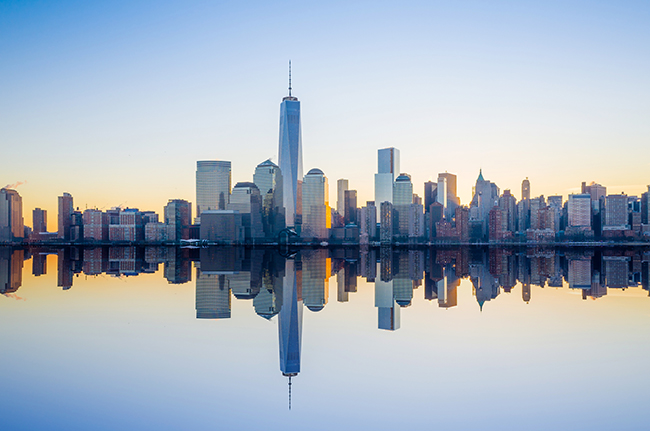REAL ESTATE SPOTLIGHT

By Daniel J. Bollinger
Meet Dan Flanigan, Chair of the 180-lawyer Real Estate & Financial Services Dept. and Managing Partner of the New York office of Polsinelli, an Am Law 100 firm, with more than 800 attorneys in 19 offices nationwide.
Dan has been a trusted advisor to lenders, helping them navigate the ups and downs of the business cycle for decades. He also makes his financing expertise and in-depth knowledge of the lending environment and culture available to the firm’s borrower clients, especially in difficult restructuring and workout situations. In recent years, Dan has been intensely involved in the Commercial Mortgage Backed Securities industry (CMBS). Dan served as lead counsel in the formation and operation of two national CMBS lenders and has continued to lead the expansion of the group’s CMBS practice. I had a chance to speak with Dan about the New York City real estate market.
Do you think either a Trump presidency or a Clinton presidency will affect NYC real estate markets?
I don’t believe we can make any assumption how either administration will change NYC real estate, because there are simply too many unknowns, especially with Trump.
What effect will BREXIT have in the NYC market?
I think there will be a minor upside to NYC but nothing dramatic. A lot of investors in the world are asking “where do I put my money now?” The U.S. is considered a safe investment, at least for now, so I think you will see some uptick from foreign investment.
What are your views on the Affordable Housing dilemma facing the city these days?
New York needs to solve this problem up and down the lower-to-middle of the economic scale. I don’t know how they will do this. The most important question for me concerns the people that take care of us in this city, the nurses, firefighters, and police. Where are they going to live?
What do you see happening with the luxury segment of the market?
“For Sale” luxury condos have gotten so much attention, but there is a glut in the luxury rental market as well. It’s going to get bumpy. There’s too much inventory in luxury and not enough below that, let’s call it the one-to-three million dollar range or even the three-to-five million dollar range (and equivalent rents in the rental area).
What do you see happening as the market softens/collapses?
I don’t see the market collapsing; this market may weaken, but it’s not collapsing. I think each situation is going to depend wholly on the nimbleness and staying power of the particular sponsor. Some buyers are going to get some real bargains. But the effects of the softening are all going to be uniquely related to the sponsor and its particular situation.
Financially, what do you see happening within this market?
The life insurance companies are doing great. That is because they are not burdened by regulations like the banks are. The banks with all their regulatory issues are going to feel some pressure. Commercial Mortgage Backed Securities has had a rough year. But we still have this maturity wave in front of us, and there should be lots of opportunity for all kinds of debt and also equity.
What do you see happening with private equity funds?
I am not sure about the future of private equity funds but speaking of debt funds, on the other hand, they certainly can bring a lot and have a lot of liquidity in this market. They also have an edge since there are no serious regulatory constraints on them either, at least for now.
What do you foresee in the next 6-to-12 months in the New York City real estate market?
It is not going to be as strong as it has been but I would say it is still going to be good—but with some bumps. The real danger is that there is so much money, especially with BREXIT bringing more funds to the market. We can hurt ourselves with deals that are too rich, prices too high. But overall I feel more confident than anything else.
When you see mega-projects like the Hudson Yards developing and the fact there are going to be 40,000 more units coming to market, do you think the MTA is planning ahead to handle all this additional commuter influx by employing more trains, longer trains, increased scheduling, etc.?
Good question, I have to admit even though I’m a straphanger myself and I “feel the squeeze” on these overcrowded subways I haven’t thought about this.
What is your opinion of gentrification in NYC?
Gentrification is good in some ways, it increases the quality of life in depressed areas by bringing more commerce to the area and more opportunities, but it is also bad in other ways especially when it kicks into overdrive. This goes back to the Affordable Housing question you asked previously. I am disappointed in myself for not being able to do more and for not having thought more about it, but it is one of the most important questions that all of us have to answer (developers, government, citizens). What are we going to do for all of the people that call NY their home but are not upper-scale buyers or renters?
Repeating myself, but it’s so vital: where are all the people that make this city run going to live? We must come up with a solution to this pressing reality. Developers obviously aren’t going to be attracted to something that doesn’t return a profit. The 421a tax abatement helped slightly, but it’s gone and much more needs to be done. Our government leaders have to work more closely with developers to solve this through programs, subsidies, funding—something. And soon!





